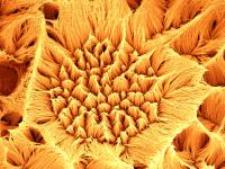Fuel cells do not last long, while the catalysts used in fuels cells disintegrate, restraining the chemical response that turns fuel into electricity. At present, nano-particles covered with the catalyst have little surface area, allowing only a tiny part of the catalyst to be used.
 Yale Nanowires from bulk metallic glass
Yale Nanowires from bulk metallic glass
An Engineering team at the Yale School of Engineering & Applied Science has developed a fuel cell catalyst system with nanowires that have been fabricated from bulk metallic glass. The research paper has been published on the cover of the ACS Nano April edition. Yale engineers, Jan Schroers and André Taylor have created nanowires made from the bulk metallic glass (BMG), which is a metal alloy. The nanowires have high surface areas, revealing the catalyst and remain active for a long time. The platinum was integrated into the nanowire alloy, so that it continued to respond to fuel over a period of time.
The chemical properties help mold them into nano-rods with a hot-press technique, according to Schroers. The cost- effective nanowires conduct electricity better than carbon black and carbon nanotubes. The system has been tested for alcohol-based fuel cells including those that are powered by ethanol and methanol.